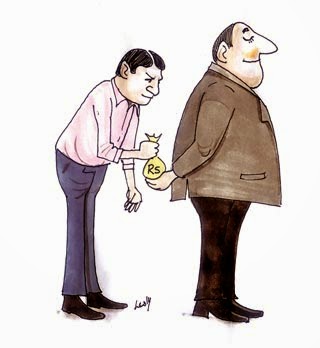Corruption is the use of public or given power for private gain. There are many forms including bribery, fraud, extortion, influencing peddling, kickbacks, cronyism, patronage, embezzlement, vote buying, and election rigging. It is an automatic thinking of civil servants that corruption is acceptable and a norm.
Corruption caused by social norm:
Cambodians, like many other high-context societies, believe that public officers will lose respect from others if they do not use their power to regard their relatives, friends or party. They will be treated as an outsider if they do not favour their superior and group. If they are given gift and they do not accept, they will be judged impolite and disrespect. Therefore, they perpetuate corruption automatically.
Corruption caused by institutional culture:
In many cases, getting a job in public sector is market – buying and selling jobs. People would like to get into this sector, which offers low salary package, because they could have sustained salary for the rest of their life and retirement package. They do not have to commit full time service to get full time pay and can earn ‘extra’ money. This practice has overtime transformed into an institutional culture and systematic practice.
Corruption is allowed by politicians:
If it is a culture which everyone knows, why they cannot change it? Simple answer is that there is no commitment to change from management and political leaders. They offer low salary, and it is an excuse that they allow corrupt practice
But, normal officials earn little from corruption and high rank officials get more, so why there many allow it to happen even the gain from corruption is not equally distributed? It is the result of both institutional culture and political will. If they break out this circle, everyone will lose. If they walk out of the circle, they will get nothing. If they remain in the position, they will get salary, retirement package, and some extra money. If they report the case, who will break the circle; everyone is corrupted.
It is political will. Most officials, if not all, can contribute to political parties for political campaigns and other activities to gain political support for the party. Low rank officials contribute little and high officials contribute more. Therefore, it a win-win strategy for both the political party and public officials.
Corruption happens due to impunity:
It is political will that corruption is not penalized. It is institutional culture that corruption is not criticized. It is the justice system which is controlled by the ruling party that does not take independent action against corruption. Culture of impunity leads to corruption cycle which never ends.
How can we break corruption cycle?
to happen so that their official can make some gain to substitute their low pay.
Since corruption is politically allowed, it requires huge amount of simultaneous actions. Below are some examples. Each action requires active participation, commitment, and motivation and must be done over and over again.
From individuals:
- Understanding corruption
- Promise not to pay or accept bribe or conduct corruption
- Promote a culture to embarrass corrupted people
- Do not corrupt, and do not corrupt
- Convince friends and family members not to corrupt
- Tolerate with the delay or difficulty in accessing to public service as the result of paying to bribe or kickbacks.- Do not corrupt and continue to commit to it
- From organizations/institutions:
- Create understanding about corruption
- Create management commitment
- Make and implement anti-corruption strategy and mechanism with zero-tolerant behavior
- Create transparent, effective and efficient system
- Commit to implement and implement the system and strategy
- Continue to commit and implement
No way they will change their mind unless they understand and there is a mechanism to take them down if they conduct corruption. There is no way politicians will change when the change jeopardize their financial capacity of their party, unless there is a law and justice system to take them down.
In India, zero-rupee notes were published and used by activists to pay to those who ask for bribes. Citizen’s voice to embarrass political leaders who are corrupt or allow corruption happening.
Corruption is rooted by social norm and allowed by powerful people for their own benefits. It requires total actions from every one to stop it. We must believe that corruption can be reduced to a minimum level that development will be fast and sustainable.




Comments
Post a Comment